昔日文章
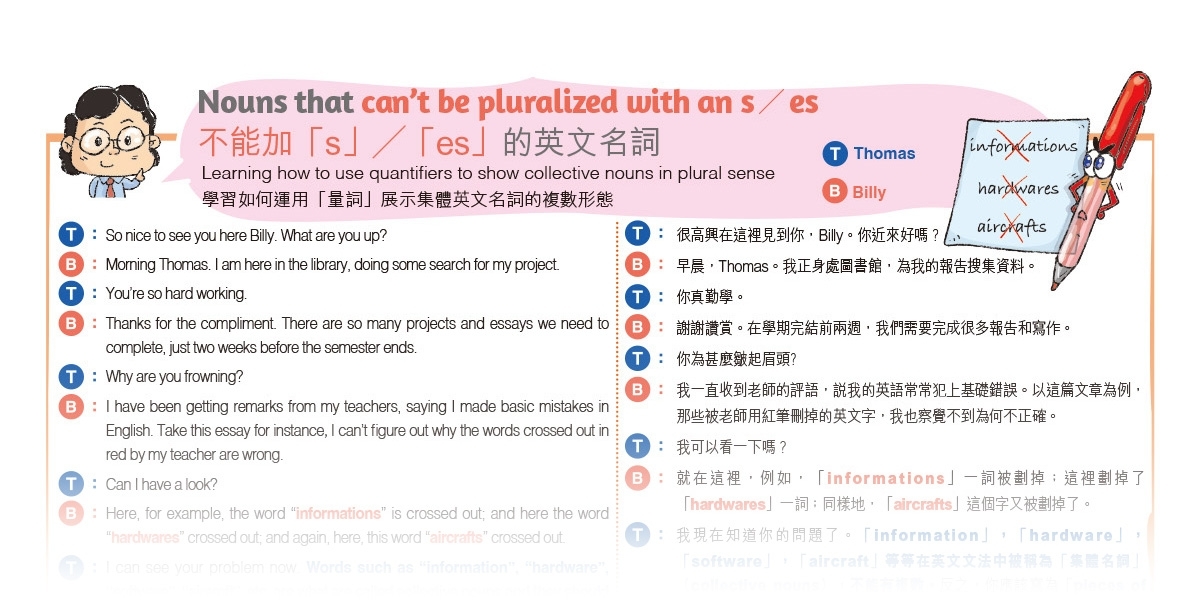

Learning English with Thomas
2023.01.15
Nouns that can’t be pluralized with an s ╱ es
an s ╱ es 不能加「s」╱「es」的英文名詞
Learning how to use quantifiers to show collective nouns in plural sense
學習如何運用「量詞」展示集體英文名詞的複數形態
T : Thomas B : Billy
T : So nice to see you here Billy. What are you up?
B : Morning Thomas. I am here in the library, doing some search fo rmy project.
T : You’re so hard working.
B : Thanks for the compliment. There are so many projects and essays we need to complete, just two weeks before the semester ends.
T : Why are you frowning?
B : I have been getting remarks from my teachers, saying I made basic mistakes in English. Take this essay for instance, I can’t figure out why the words crossed out in red by my teacher are wrong.
T : Can I have a look?
B : Here, for example, the word “informations” is crossed out; and here the word “hardwares” crossed out; and again, here, this word “aircrafts” crossed out.
T : I can see your problem now. Words such as “information”, “hardware”, “software”, “aircraft”, etc. are what are called collective nouns and they should not be pluralized. Instead, you should write “pieces of information”. For “hardware” you’d say “hardware systems”; and for “aircraft” you’d say “units of aircraft”. Such nouns in English usage need quantifiers to show a plural sense.
B : I see. That’s something I must bear in mind from now on. Thanks so much for the explanation.
T : 很高興在這裡見到你,Billy。你近來好嗎?
B : 早晨,Thomas。我正身處圖書館,為我的報告搜集資料。
T : 你真勤學。
B : 謝謝讚賞。在學期完結前兩週,我們需要完成很多報告和寫作。
T : 你為甚麼皺起眉頭﹖
B : 我一直收到老師的評語,說我的英語常常犯上基礎錯誤。以這篇文章為例, 那些被老師用紅筆刪掉的英文字,我也察覺不到為何不正確。
T : 我可以看一下嗎?
B : 就在這裡, 例如, 「i n f o r m a t i o n s 」一詞被劃掉; 這裡劃掉了 「hardwares」一詞;同樣地,「aircrafts」這個字又被劃掉了。
T : 我現在知道你的問題了。「information」,「hardware」, 「software」,「aircraft」等等在英文文法中被稱為「集體名詞」(collective nouns),不能有複數。反之,你應該寫為「pieces of information」。至於「hardware」,您可以用「hardware systems」(硬件系統);而「aircraft」可以說成「units of aircraft」(飛機單位)。這些名詞,在英文運用上,要加上「量詞」(quantifiers)才能量化。
B : 原來如此。我今後必須牢記這些的知識。非常感謝您的講解。
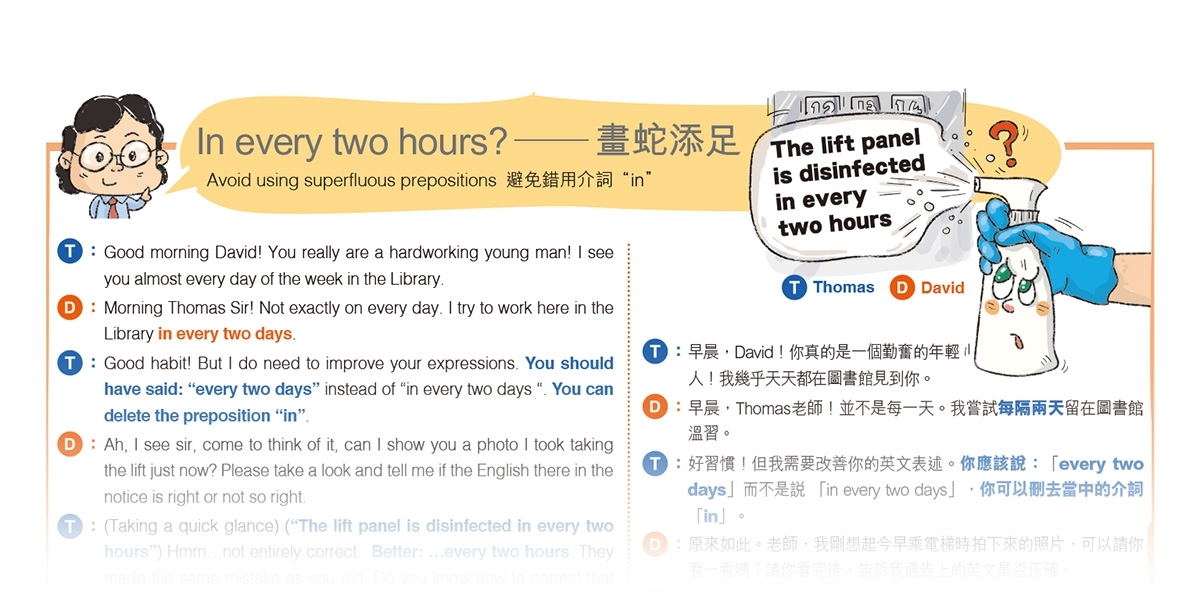

Learning English with Thomas
2022.12.04
In every two hours? —— 畫蛇添足
Avoid using superfluous prepositions 避免錯用介詞“in”
T : Thomas D : David
T : Good morning David! You really are a hardworking young man! I see you almost every day of the week in the Library.
D : Morning Thomas Sir! Not exactly on every day. I try to work here in the Library in every two days.
T : Good habit! But I do need to improve your expressions. You should have said: “every two days” instead of “in every two days “. You can delete the preposition “in”.
D : Ah, I see sir, come to think of it, can I show you a photo I took taking the lift just now? Please take a look and tell me if the English there in the notice is right or not so right.
T : (Taking a quick glance) (“The lift panel is disinfected in every two hours”) Hmm…not entirely correct. Better: …every two hours. They made the same mistake as you did. Do you know how to correct that now?
D : Now I can, sir. It should be: “The lift panel is disinfected every two hours.” Is that right?
T : Haha! You certainly got it – learning fast and applying at once. (Teacher raising his thumb smilingly)
T : 早晨,David!你真的是一勤奮的年輕人!我幾乎天天都在圖書館見到你。
D : 早晨,Thomas老師!並不是每一天。我嘗試每隔兩天留在圖書館溫習。
T : 好習慣!但我需要改善你的英文表述。你應該說:「every two days」而不是說 「in every two days」,你可以刪去當中的介詞 「in」。
D : 原來如此。老師,我剛想起今早乘電梯時拍下來的照片,可以請你看一看嗎?請你看完後,告訴我通告上的英文是否正確。
T : (瞥了一眼)(「The lift panel is disinfected in every two hours」)嗯……這樣寫不完全正確,寫成「every two hours」較佳。 他們跟你一樣犯了相同的錯誤。你現在懂得如何修改嗎﹖
D : 老師,現在我懂了。這應該改為:「The lift panel is disinfected every two hours」,對嗎?
T : 哈哈,你果然是學以致用。(老師欣慰地豎起大姆指)
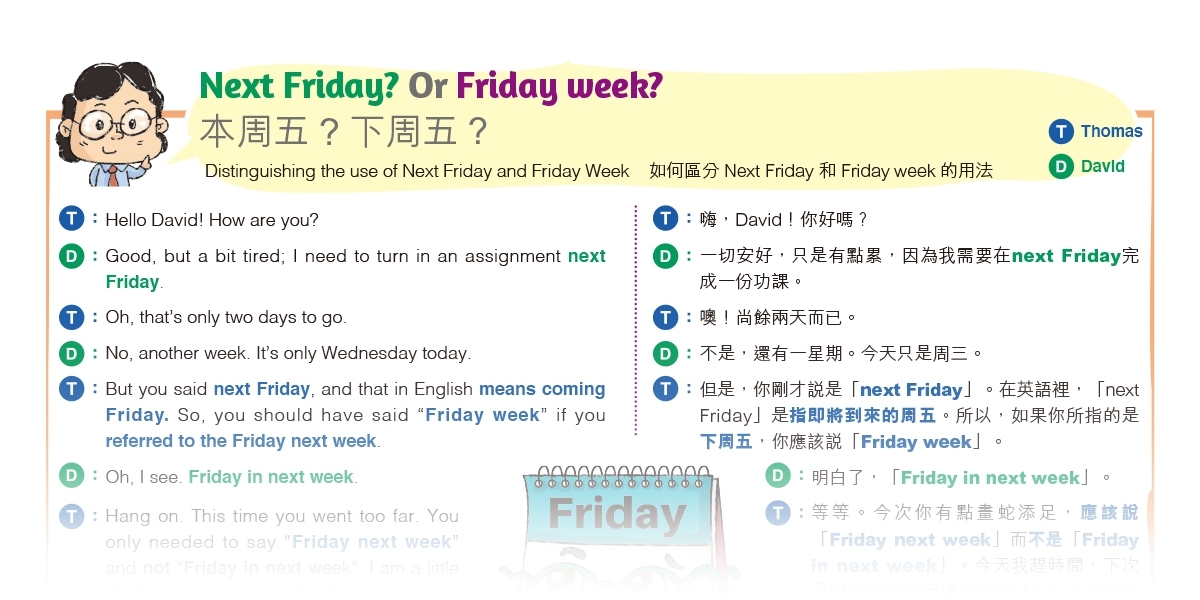

Learning English with Thomas
2022.11.13
Next Friday? Or Friday week?
本周五? 下周五?
Distinguishing the use of Next Friday and Friday Week 如何區分Next Friday 和 Friday week 的用法
T : Thomas D: David
T : Hello David! How are you?
D : Good, but a bit tired; I need to turn in an assignment next Friday.
T : Oh, that’s only two days to go.
D : No, another week. It’s only Wednesday today.
T : But you said next Friday, and that in English means coming Friday. So, you should have said “Friday week” if you referred to the Friday next week.
D : Oh, I see. Friday in next week.
T : Hang on. This time you went too far. You only needed to say “Friday next week” and not “Friday in next week”. I am a little short on time today, so I’ll talk with you more about how to use the preposition “in” to denote points of time and dates.
D : Righto, OK, and thanks again.
T : 嗨,David!你好嗎?
D : 一切安好,只是有點累,因為我需要在next Friday完成一份功課。
T : 噢!尚餘兩天而已。
D : 不是,還有一星期。今天只是周三。
T : 但是,你剛才說是「next Friday」。在英語裡,「next Friday」是指即將到來的周五。所以,如果你所指的是下周五,你應該說「Friday week」。
D : 明白了,「Friday in next week」。
T : 等等。今次你有點畫蛇添足, 應該說「Friday next week」而不是「Friday in next week」。今天我趕時間,下次再跟你談談如何運用介詞「in」去指示時間和日期。
D : 好的,再次感謝你。
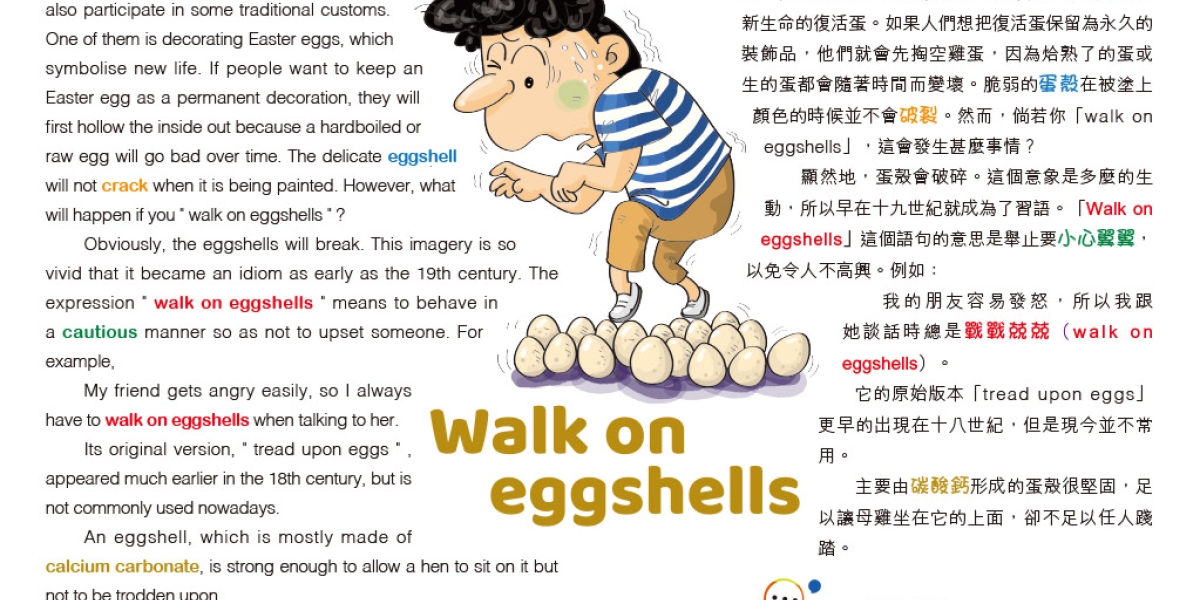
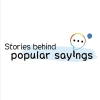
Stories Behind Popular Sayings
2022.04.01
Walk on eggshells
In two weeks, Christians will celebrate the Resurrection of Jesus on Easter Sunday. They also participate in some traditional customs. One of them is decorating Easter eggs, which symbolise new life. If people want to keep an Easter egg as a permanent decoration, they will first hollow the inside out because a hardboiled or raw egg will go bad over time. The delicate eggshell will not crack when it is being painted. However, what will happen if you " walk on eggshells " ?
Obviously, the eggshells will break. This imagery is so vivid that it became an idiom as early as the 19th century. The expression " walk on eggshells " means to behave in a cautious manner so as not to upset someone. For example,
My friend gets angry easily, so I always have to walk on eggshells when talking to her.
Its original version, " tread upon eggs " , appeared much earlier in the 18th century, but is not commonly used nowadays.
An eggshell, which is mostly made of calcium carbonate, is strong enough to allow a hen to sit on it but not to be trodden upon.
兩個星期後,基督徒會在復活主日慶祝耶穌復活。他們也參與一些傳統習俗。其中之一是裝飾象徵新生命的復活蛋。如果人們想把復活蛋保留為永久的裝飾品,他們就會先掏空雞蛋,因為烚熟了的蛋或生的蛋都會隨著時間而變壞。脆弱的蛋殼在被塗上顏色的時候並不會破裂。然而,倘若你「walk on eggshells」,這會發生甚麼事情?
顯然地,蛋殼會破碎。這個意象是多麼的生動,所以早在十九世紀就成為了習語。「Walk on eggshells」這個語句的意思是舉止要小心翼翼, 以免令人不高興。
例如: 我的朋友容易發怒, 所以我跟她談話時總是戰戰兢兢( walk on eggshells)。
它的原始版本「tread upon eggs」更早的出現在十八世紀,但是現今並不常用。
主要由碳酸鈣形成的蛋殼很堅固,足以讓母雞坐在它的上面,卻不足以任人踐踏。
捐款支持公教報 http://kkp.org.hk/donation


